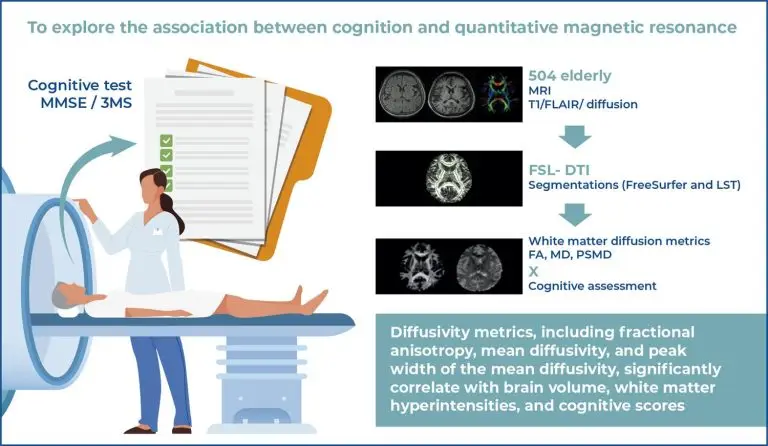22/Sep/2025
Exploring the relationship between cognitive performance and magnetic resonance imaging diffusion parameters in elderly individuals
einstein (São Paulo). 22/Sep/2025;23:eAO1467.
View Article22/Sep/2025
Exploring the relationship between cognitive performance and magnetic resonance imaging diffusion parameters in elderly individuals
DOI: 10.31744/einstein_journal/2024AO1467
Highlights ■ First study to investigate associations between cognitive performance and brain magnetic resonance imaging parameters in an older Brazilian population. ■ Uses advanced magnetic resonance imaging diffusion tensor imaging and automated analysis to quantify brain changes. ■ Validates findings through comparison with data from a large UK-based cohort. ■ Focuses on region-specific assessments, such as the superior longitudinal fasciculus and other key brain areas related to cognition. ■ Demonstrates significant correlation between 3MS and MMSE cognitive scores and diffusion […]
Keywords: Aged; Cognition; Cognitive dysfunction; Dementia; Diffusion tensor imaging; Magnetic resonance imaging; Neuroimaging; Neuropsychological tests
01/Jan/2015
Definition and application of neuropsychological test battery to evaluate postoperative cognitive dysfunction
einstein (São Paulo). 01/Jan/2015;13(1):20-6.
View Article01/Jan/2015
Definition and application of neuropsychological test battery to evaluate postoperative cognitive dysfunction
DOI: 10.1590/S1679-45082015AO3152
Objective To investigate the adequacy of the neuropsychological test battery proposed by the International Study of Postoperative Cognitive Dysfunction to evaluate this disorder in Brazilian elderly patients undergoing surgery under general anesthesia. Methods A neuropsychological assessment was made in patients undergoing non-cardiac surgery under general anesthesia, aged over 65 years, literate, with no history of psychiatric or neurological problems and score on the Mini Mental State Examination at or above the cutoff point for the Brazilian population (>18 or >23) […]
Keywords: Aged; Anesthesia, general; Cognition disorders; Neuropsychological tests; Postoperative period
01/Apr/2014
Learning effect of computerized cognitive tests in older adults
DOI: 10.1590/S1679-45082014AO2954
Objective To evaluate the learning effect of computerized cognitive testing in the elderly. Methods Cross-sectional study with 20 elderly, 10 women and 10 men, with average age of 77.5 (±4.28) years. The volunteers performed two series of computerized cognitive tests in sequence and their results were compared. The applied tests were: Trail Making A and B, Spatial Recognition, Go/No Go, Memory Span, Pattern Recognition Memory and Reverse Span. Results Based on the comparison of the results, learning effects were observed […]
Keywords: computer assisted; Diagnosis; Elderly; Learning; Neuropsychological tests
29/Oct/2012
Dementia Rating Scale psychometric study and its applicability in long term care institutions in Brazil
DOI: 10.1590/S1679-45082012000300011
OBJECTIVE: To evaluate the diagnostic sensitivity, specificity, and agreement of the Dementia Rating Scale with clinical diagnosis of cognitive impairment and to compare its psychometric measures with those from Mini Mental State Examination. METHODS: Eighty-six elders from a long-term care institution were invited to participate in a study, and fifty-eight agreed to participate. The global health assessment protocol applied to these elders contained Mini Mental State Examination and Dementia Rating Scale. Clinical diagnose of cognitive impairment was performed by experts […]
Keywords: Aged; Cognition; Delirium, dementia, amnestic, cognitive disorders; Homes for the aged; Neuropsychological tests; Scales; Sensitivity and specificity
01/Jan/2010
Effects of Tai Chi Chuan on cognition of elderly women with mild cognitive impairment
DOI: 10.1590/S1679-45082010AO1470
ABSTRACT Objective: To detect the effects of Tai Chi Chuan practice on the cognition of elderly subjects with Mild Cognitive Impairment. Methods: This is a pilot study with 26 elderly patients (mean age of 74 years) with Mild Cognitive Impairment. The evaluation instruments were Subjective Memory Complaint Scale (SMC), Rivermead Behavioral Memory Test (RBMT) and Digit Span Forward and Backward (DSF and DSB) from the Wechsler Adult Intelligence Scale (WAIS). One group of 13 patients received two weekly 60-minute classes […]
Keywords: Alzheimer disease; Alzheimer disease/prevention & control; Alzheimer disease/rehabilitation; Exercise movement techniques; Health services for the aged/psychology; Memory disorders/therapy; Neuropsychological tests; Pilot projects; Tai ji



